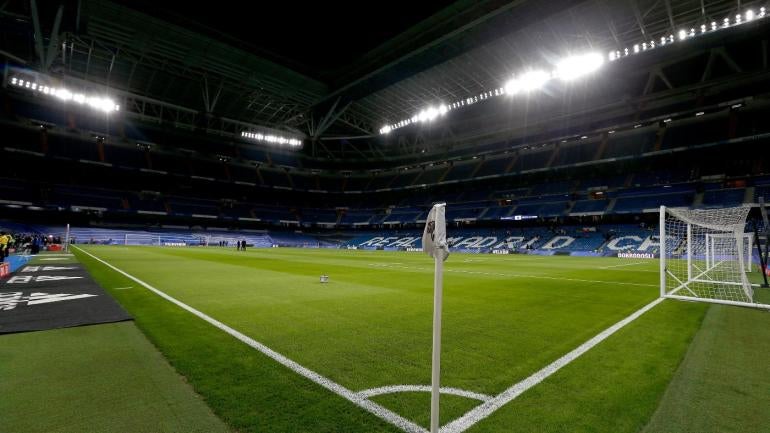
A revised European Super League would open the door to up to 80 clubs a year across several divisions, its chief executive has said. A22 Sports Management is promoting a revision of the plans that collapsed in 2021 following the withdrawal of six Premier League sides and says that this time no members would be afforded a permanent seat at the table of a competition that would provide clubs with a guaranteed minimum of 14 matches per season.
"The foundations of European football are in danger of collapsing," A22 chief executive Bernd Reichart told German newspaper Die Welt. "It's time for a change. It is the clubs that bear the entrepreneurial risk in football. But when important decisions are at stake, they are too often forced to sit idly by on the sidelines as the sporting and financial foundations crumble around them.
"Our talks have also made it clear that clubs often find it impossible to speak out publicly against a system that uses the threat of sanctions to thwart opposition. Our dialogue was open, honest, constructive and resulted in clear ideas about what changes are needed and how they could be implemented. There is a lot to do and we will continue our dialogue."
What is the background to the Super League?
Plans for a Super League first emerged in April 2021, a 20-team league with guaranteed spots for 12 founder clubs and three sides who were due to join at a later date. A further five spots would have been awarded based on sporting achievements, though the specifics of this were never made plain. Within 48 hours, the English representatives -- Arsenal, Chelsea, Liverpool, Manchester City, Manchester United and Tottenham -- had all withdrawn following a ferocious reaction from supporters. Atletico Madrid, Inter Milan and AC Milan also stepped back from plans.
However, Real Madrid, Barcelona and Juventus continue to push for the right to form a breakaway league and are locked in a legal battle with UEFA. The European Court of Justice (ECJ) is expected to rule on the matter later this year. In December, a non-binding opinion from advocate general Athanasios Rantos deemed it to be compatible with European law for UEFA and FIFA to retain approval right for any new tournaments.
What is different about this iteration?
Reichart's plans for the revised tournament would open the door for more clubs to be involved though no details were laid out to explain how the initial 80 would be selected and, crucially, what it would take for top clubs to lose their access to the minimum extra 14 games. The A22 chief executive added that national leagues would be "the foundation" of the game with revenue from the new league supporting the entire footballing pyramid.
Cost control measures, a significant factor that earned the original plans the backing of American owners in the Premier League, would also be introduced and Reichart wrote "club spending must be based solely on the funds generated and not on competitively distorting capital injections." This is something that UEFA is also planning for next year, seeing the arrival of regulations that will ultimately limit teams to spending at most 70 percent of their revenue on player and coach wages, transfers, and agent fees.
In a more detailed statement, A22 laid out ten principles that were guiding their plans. The first of those was labeled "Broad Based and Meritocratic Competitions" stating that "open qualification based on domestic performance would grant rising clubs access to the competition while maintaining competitive dynamics at domestic level." Again there was no indication of how this qualification would work nor indeed why this would be any different to UEFA's club competitions.
A22 also stated as their fourth principal that "player health must be at the center of the game." Their statement noted that "the number of European club competition match days should not be increased beyond those in currently planned competition calendars," though a commitment to 14 matchdays a year would represent an increase for clubs who might only play six Champions League group games with perhaps a smattering of qualifiers or Europa League games thereafter.
Underpinning A22's grand plans remains the same principle that was at the center of the original Super League proposal. "European club competitions should be governed by the clubs as they are domestically, not by third parties who benefit without taking any risk," their statement said. Inherently, that proposal is incompatible with UEFA's vision for football.
What has been the reaction to the plans?
La Liga president Javier Tebas was among the first to respond to Reichart's pitch. "The Super League is the wolf who today disguises himself as a granny to try to fool European football, but his nose and his teeth are very big," he wrote on Twitter.
"Four divisions in Europe? Of course the [top division] for them [the founding clubs], as in the 2019 plan. Governance of the clubs? Of course only from the big ones."
The European Club Association [ECA], spearheaded by Paris Saint-Germain's Nasser Al-Khelaifi after the French side stuck in UEFA's corner during the initial breakaway movement of 2021, said: "ECA notes the latest dispatch from A22's alternative reality. However, in the real world, this rehashed idea has already been proposed, discussed and comprehensively rejected by all stakeholders in 2019. This is just another deliberately distorted and misleading attempt to de-stabilise the constructive work currently taking place between football's real stakeholders to move things forward in the overall best interests of the European club game.
"As the sole organization recognized by FIFA and UEFA representing clubs at European and international level, and the only body through which clubs have genuine representation in their decision-making, ECA reiterates its long-standing opposition to the European Super League and any breakaway project.
"From 2024[,] more clubs from more countries will participate in European men's club competitions every season, growing the passion of European football and greatly increasing the amount of revenue being shared. Significant progress can be seen across other aspects of the game from women's football, youth and academy development, finance and regulation to sustainability and social impact. This is what real change looks like. We have moved on, when will A22?"
The ECA's statement on 2024 refers to UEFA's European competitions moving to a Swiss system in 2024-25, a 36-team league in which every club will be guaranteed a minimum of eight matches and most will play at least 10.
The Football Supporters Association, an influential group of fans in England and Wales who led the clarion call against the initial incarnation, were no less scathing. Their chief executive Kevin Miles said, "The walking corpse that is the European Super League twitches again with all the self-awareness one associates with a zombie. Their newest idea is to have an 'open competition' rather than the closed shop they originally proposed that led to huge fan protests.
"Of course an open competition for Europe's top clubs already exists - it's called the Champions League.
"They say 'dialogue with fans and independent fan groups is essential' yet the European Zombie League marches on - wilfully ignorant to the contempt supporters across the continent have for it."
Why are some clubs so keen on this?
The answer to this lay in another document released on Thursday morning, FIFA's survey of the global transfer market, which revealed that in January English clubs accounted for 57 percent of spending in the January window, one where Chelsea blew other clubs out of the water with nearly $400 million in expenditure. As the Premier League draws more eyeballs around the world (around $10 billion over a three-season cycle, with more than half coming from outside England), there are fears within the top clubs of the European game that if they do not act now they will not just be outmuscled by Manchester City, Chelsea and Liverpool, but by the West Hams and Aston Villas of the world. The Premier League would, to all intents and purposes, be a super league in the same fashion as the NBA.
Before leaving Juventus amid scandal and criminal investigations, Andrea Agnelli, one of the key architects of the initial Super League proposals, said, "I believed and still believe that European soccer needs structural reforms to tackle the future. Otherwise, we are heading for inexorable decline for soccer in favor of a dominant league, the Premier League, which over a few years will attract all the European talent and marginalize the others."
Could the Super League happen this time?
It is perhaps a little early to say with certainty but the six Premier League clubs were so utterly stung by the opprobrium of their fans that it is hard to see them backing any future plan without some indication that their supporters would be up for it. The fact that the owners of Liverpool and Manchester United have concluded over the past two years that they do not want to retain full control of their clubs at least suggests that they do not see an immediate path to the sort of explosion in revenue that the Super League initially promised.
Notably, CBS Sports understands that much of Reinhard's efforts to get clubs onboard -- he has spoken to around 50 clubs across the continent -- has been focused away from England. The Premier League does not face the same existential financial questions as many European clubs, indeed much of A22's pitch has been about warning of the disparities between one league and the rest. Even A22 would acknowledge that they may not be able to sway as many English sides, whose rationale for joining in the first place was that it was better to be out than in if it was happening anyway, this time around.
The ECJ could offer succor for Madrid, Barcelona and Juventus if they conclude that clubs should have the right to form their own leagues while remaining within existing structures. Rantos' initial response -- that UEFA should allow rival competitions to exist but was under no obligation to allow clubs to play in their competition too -- was widely viewed as an early victory for the governing body though certainly not a binding one. For now, the domestic leagues seem to be backing UEFA and with their support, it is hard to envisage a mass exodus from the status quo.





















